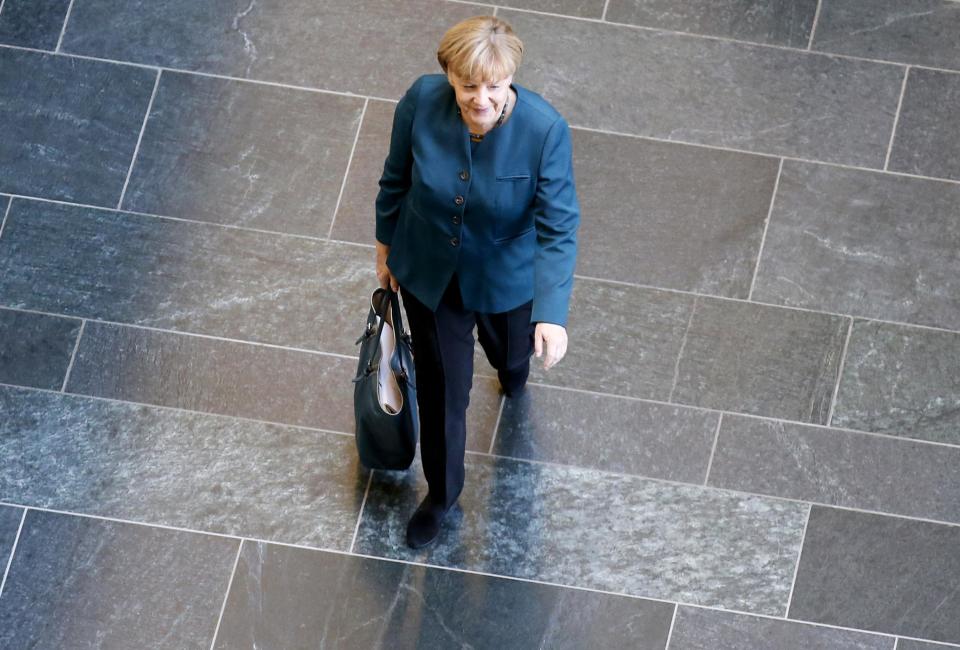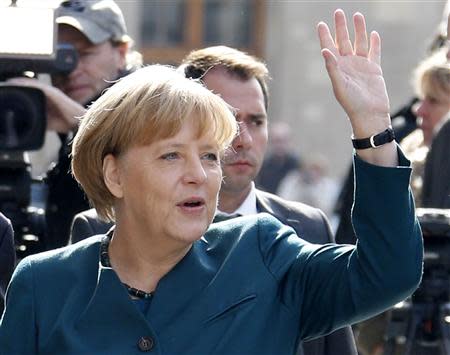Merkel, SPD welcome further talks on German government
By Erik Kirschbaum and Sarah Marsh BERLIN (Reuters) - Angela Merkel's conservatives and the opposition Social Democrats (SPD) agreed to meet again in 10 days to explore forming a "grand coalition" government after an initial three-hour meeting on Friday was called constructive by both sides. The German chancellor's Christian Democrats (CDU/CSU) emerged as the dominant party from the September 22 election but need a coalition partner and Friday's meeting marked the start of complex horse-trading that could last two months or more. The SPD is seen as Merkel's most likely partner but is in no hurry to back her again after its support was decimated during the 2005-09 grand coalition. Merkel will meet leaders of the Greens party, another potential coalition partner, on Thursday. The announcement that a second round of exploratory discussions with the SPD would take place on October 14 was not surprising but that and positive comments from participants suggested there may be enough common ground between Germany's two main parties for formal coalition talks in October that could lead to a new government next month. "The atmosphere was good, business-like and constructive," Hermann Groehe, Merkel's deputy in the CDU, told reporters. "Both sides have in mind the major challenges lying ahead for our country and Europe. There is a lot of common ground there." A leader of the SPD delegation, Andrea Nahles, also used unexpectedly positive language on Friday after a bitter election campaign, saying there was "an open-minded atmosphere" and many common positions along with issues where there are differences. Until now many SPD leaders had expressed doubts and outright opposition about a grand coalition with Merkel. Many grass roots SPD supporters are also opposed, fearing Germany's oldest party would further lose its identity under the popular chancellor. The SPD plans to allow its 472,000 members to vote on any coalition agreement with Merkel's conservatives, an unprecedented and risky move that could complicate or even doom the formation of a grand coalition government. EUROPE WATCHING AND WAITING European partners are watching the political maneuvering in Berlin closely, concerned that delay could push back EU-wide decisions on financial crisis-fighting measures such as an ambitious plan for a banking union. German agreement is essential to create a pan-European mechanism to recapitalize or wind down troubled banks, with a joint financial backstop. At stake in the preliminary talks is whether the two mainstream parties can agree on tax measures, a minimum wage and infrastructure investment to rebalance Europe's biggest economy, and form a government with broad enough public backing to tackle the euro zone's banking and debt problems. The CDU/CSU will nevertheless hold a similar round of preliminary talks with the Greens party on Thursday. A conservative-Greens government is considered unlikely but Merkel's party needs that option to put pressure on the SPD. "We only identified the major topics and didn't go into details today," said Nahles, the left-wing general secretary of the SPD. "We identified some consensus points but we also talked about controversial points and identified differences, and further talks are thus needed." The two parties disagree on key areas such as taxation, wages and investment. While the SPD campaigned for higher taxes on the rich, the conservatives ruled out increasing any taxes, but they could compromise by agreeing to crack down on tax evasion and closing loopholes for big corporations. The center-left SPD are expected to make introducing a national minimum wage a condition for a coalition. Merkel prefers "wage floors" agreed by region or sector but she may have to accept a blanket minimum to get a deal, perhaps not as high as the 8.50 euros ($11.60) an hour the SPD wants. The two parties may also agree on ramping up public investment in transport, energy and communications networks - an SPD demand - and on curbing costly renewable energy subsidies. (Writing by Erik Kirschbaum and Sarah Marsh; Editing by Paul Taylor and Giles Elgood)



